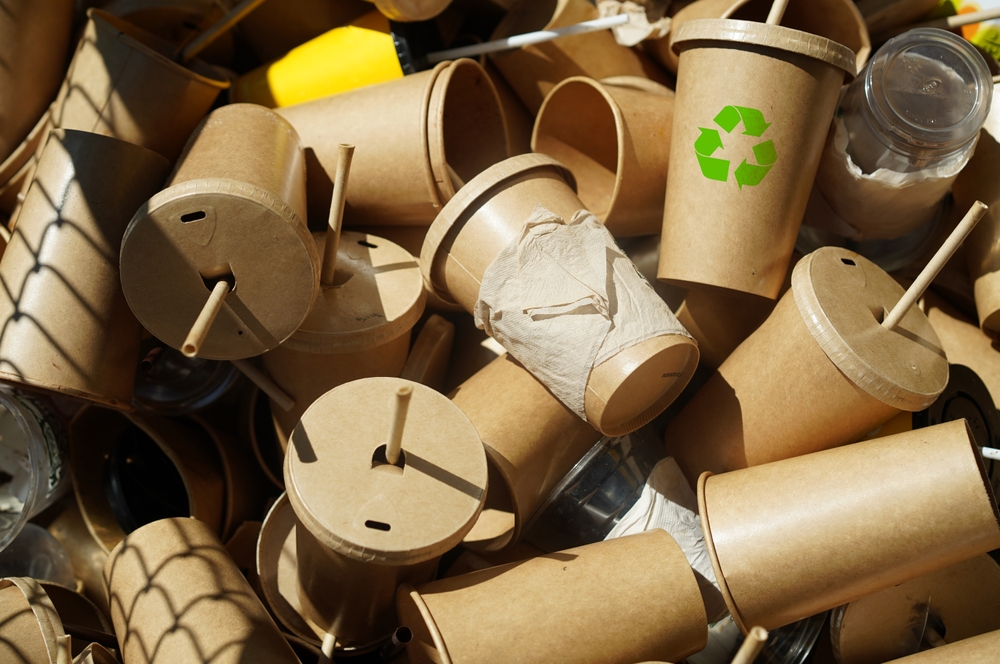
Residents were already “wishcycling” the cups, so the locally owned recycler decided to pave the way to formal acceptance. | Oasishifi/Shutterstock
The city of Omaha recently added paper take-out cups to its list of accepted items for recycling, with locally owned First Star Recycling leading the way in the resident-driven effort.
Starting in April, Nebraska’s biggest city announced it would accept paper cups for both hot and cold drinks in its curbside carts as well as at drop-off locations. “By increasing the variety of recyclable items, the city aims to make it easier for residents to participate in recycling programs and contribute to a cleaner environment,” the city said in an Earth Day press release.
Local residents were already “wishcycling” paper cups in their curbside collection, and First Star buyers were comfortable with the current ratios of cups in their OCC and mixed-paper bales, CEO Patrick Leahy told Resource Recycling.
“So it’s no big deal if all of a sudden 10% of your stream” is paper cups, “but this is not the number you’re going to see,” he said. Even though cups represent a small share of First Star’s collected volumes, “if you just look at the cups as an issue, how much is out there, it’s a huge quantity. People would be surprised.”
And while cups already were entering the recycling stream, residents were prone to receiving and conveying misleading or inaccurate information, he said. As with any misinformation surrounding recyclability, that confusion can lead residents to either throw away recyclables or to recycle unacceptable materials, and “either way, it’s not a good solution.”
Leahy himself has corrected people who insist cups are not accepted. On a formal basis, however, the company’s municipal contracts stipulate that the cities of Omaha and Lincoln maintain communication with residents. And for communities where First Star doesn’t hold the contract, such as Grand Island, they can notify the hauler of the change on an FYI basis, leaving it to the private business to communicate with residents if they so choose.
Closed Loop Partners’ NextGen Consortium worked with First Star to provide draft language for making the change. “We’re partners with them on a host of other things,” Leahy said. In 2018, First Star received a $2 million loan from Closed Loop Partners to upgrade its Omaha MRF.
Increasing paper cup recycling is a NextGen initiative, and “we’re happy to go along and be a part of it,” Leahy said. In May 2024, the consortium and the Foodservice Packaging Institute announced that more than 40 U.S. paper mills accepted single-use PE-coated paper cups in bales of mixed paper and other cartons, thanks to initiatives like one in the Carolinas. FPI also maintains an updated list of end markets on its site.
First Star was already working with the institute on improving UBC sorting accuracy, Leahy said: “Some UBC gets diverted to the wrong stream when it gets smashed; it acts like paper in the system. So we were working with them, and they found out that we were doing the paper cups.”
As part of FPI’s Paper Cup Alliance to promote recycling, the organization will run digital billboards in Omaha to bolster the message. “I’m happy about that, because that is independent of the city. It’s just educational,” Leahy said.
FPI also will supply window decals to distribute to local coffee shops, he said. As an added bonus, the rapidly growing Scooter’s Coffee company is headquartered in Omaha and is among the biggest U.S. drive-through coffee franchises.
“We want to see them really push it,” Leahy said. “We hope we can get some more legs out of that.”
First Star services Omaha and the capital of Lincoln, about an hour away. The cities have a combined population of almost 800,000 – about 40% of the state’s 2 million residents.
In 2024, First Star collected 8,400 tons of OCC and 6,123 tons of residential mixed paper in Omaha, representing about two-thirds of its total volumes, according to the company’s annual recycling report for the city. The mixed paper went into cellulose insulation and folding box board manufacturers in the Midwest.
The next internal audit will be in November and will provide a sort of baseline for the collection, despite taking place well after the city began accepting the cups.
The city also accepts EPS foam cups, plastic lids and straws in Hefty ReNew bags. In 2024 First Star collected 88 tons of these hard-to-recycle plastics from the program to manufacture its own composite lumber.

